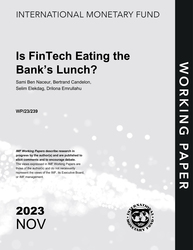
Is FinTech Eating the Bank's Lunch?
Is FinTech Eating the Bank's Lunch?
READ MORE...
Volume/Issue:
Volume 2023
Issue 239
Publication date: November 2023
ISBN: 9798400258107
$20.00
Add to Cart by clicking price of the language and format you'd like to purchase
Available Languages and Formats
| English |
Prices in red indicate formats that are not yet available but are forthcoming.
Topics covered in this book
This title contains information about the following subjects.
Click on a subject if you would like to see other titles with the same subjects.
Banks and Banking , Economics- Macroeconomics , Economics / General , fintech , bank profitability , competition , business models , balance sheet lending , FinTech business models , Annex II , bank's lunch , baseline estimation result , Commercial banks , Cooperative banks , Financial statements , Income , Global , Caribbean
Summary
This paper examines how the growing presence of FinTech firms affects the performance of traditional financial institutions. The findings point to a negative impact on profitability, primarily due to a reduction in interest income and a rise in operational costs. Although established financial institutions have tried to diversify their revenue streams, these efforts have proven inadequate to offset the losses associated with increased competition from FinTech firms. Our study also reveals that various FinTech business models, such as Peer-to-Peer (P2P) lending and Balance Sheet lending, have varying effects on financial institutions. Cooperative banks experience more significant profit deterioration under both models, whereas (larger) commercial banks appear to benefit from partnerships with P2P platforms, as evidenced by an increase in non-interest income. Furthermore, the findings suggest that FinTech presence has a disproportionately larger adverse effect on banks in countries with more competitive, profitable, and developed financial systems. Interestingly, however, traditional financial institutions in countries with stronger regulatory frameworks appear to benefit from the expanding influence of FinTech firms.
Copyright © 2010 - 2026
Powered by:
AIDC



